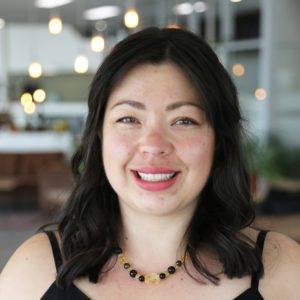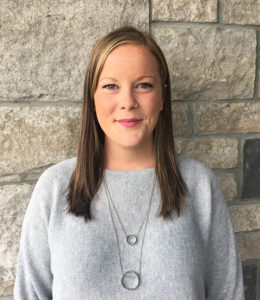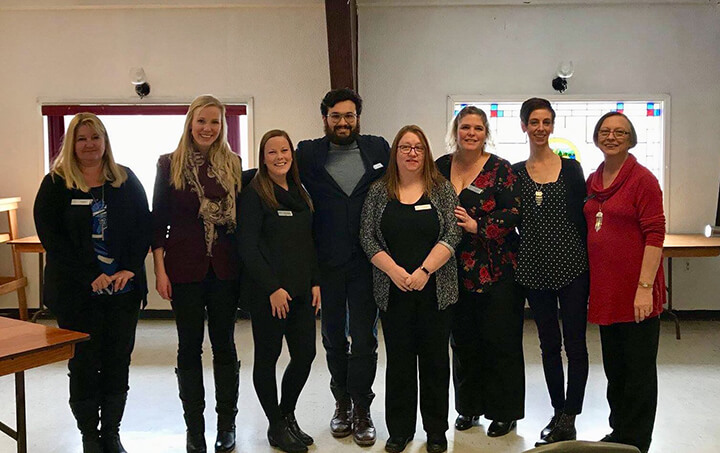Every year, Algonquin College celebrates the incredible achievements of its alumni through the Alumni of Distinction Awards. These awards honour the extraordinary contributions our graduates make to the community while achieving career success. Here is a closer look at the Recent Graduate award recipient.
 Community is vital to Naomi Fong. When she speaks about her two years studying at the Pembroke Campus of Algonquin College, one of the things she highlights is the extraordinarily tight community she formed with her fellow students in the Social Service Worker program. Even now, you can hear the enthusiasm in her voice as she speaks about this special time in her life.
Community is vital to Naomi Fong. When she speaks about her two years studying at the Pembroke Campus of Algonquin College, one of the things she highlights is the extraordinarily tight community she formed with her fellow students in the Social Service Worker program. Even now, you can hear the enthusiasm in her voice as she speaks about this special time in her life.
Originally, she planned to study in a different program at the Ottawa campus. But when she looked into becoming a Social Service Worker at Pembroke, she saw a natural fit with her interests and her personal priorities. She wanted to learn how to help others and at the same time learn more about herself. She wanted to develop the confidence to be a full contributor to group work, to stand and speak in public, and to earn her credentials.
“My studies helped me come into my own skin and be confident and tell my story safely in a way that I hope can help others,” she says.
Naomi’s story is a difficult one to hear — but one she wants you to know. The nine-year veteran of the Canadian Armed Forces, now retired, was sexually assaulted while she was in the military. The attacks devastated her physically and mentally. One incident in particular that contributed to her Post-Traumatic Stress Disorder (PTSD) resulted in a physical injury that denied her one of her fondest wishes: to serve her country overseas. The former Bombardier is proud of her achievements in domestic operations serving Canada and the military but she says she will always regret that an overseas posting eluded her.
The assault completely altered her personal and professional trajectory. She says she went from being a proud member of the military to someone chain-smoking alone in her basement and refusing to come out into the light. It has only been gradually and with considerable help from the College and others that she has been restored to something like normal life. She describes the ongoing process as years of taking small steps in order to cope with the negative cycles that accompany PTSD.
One of her first initiatives involved taking a yoga teacher training course, where she rediscovered the sense of community she had once enjoyed in the military.
“Then I stepped into the College, and I found another community where you look at who you are and where you want to be, and there are people to help you get there academically and in terms of your mental health. I received a lot of support from my colleagues and professors and the Centre for Accessible Learning; they were there for me when I needed them.”
What the honours graduate gained through her studies, she says, now helps her tie everything together: she uses what she learned and experienced at the College in her dealings with other people when she’s speaking in public when she is making decisions about what comes next in her life.
One of those decisions after completing her diploma involved joining 39 Canadians competing in 13 sports at the 2018 Invictus Games in Sydney, Australia in October 2018. The games, an international event founded by Prince Harry, Duke of Sussex, showcases the physical accomplishments of wounded and injured armed service personnel and veterans from around the world. Fong, a dedicated athlete who can be found daily at the gym, took home two bronze medals in the Women’s Road Cycling competitions, competed in three other sports, and was the Team Canada flag bearer at the opening ceremonies.
Fong says despite a disability and obstacles she is becoming “one per cent better every day.” She maintains a Facebook page promoting her values of fitness and creative expression. She says Algonquin College gave her a platform to practice making presentations and acquire confidence when speaking in public, and she believes that might provide a pathway to her next career.
“Talking about mental health and mental illness is a way forward. It’s healing for the speaker and for the listener. My education is helping me tell my story. If I can take what I learned and help others if I can help them feel safe and know they aren’t defined by their injury — maybe that will be my way to make a difference.”
 #DidYouKnow that we offer WIN Counselling Clinics for students? WIN = What’s Important Now? These clinics consist of 6x 30-minute appointments available for students who have immediate needs they want to address, or an issue they don’t need a regular, longer appointment for. These clinics will be every Tuesday and Thursday afternoon from 1 pm-4 pm. Students need to sign-up the morning of, between 8 am-12 pm. Information and the sign-up sheet is located in the back of Student Services, in the counselling waiting area. Check out our
#DidYouKnow that we offer WIN Counselling Clinics for students? WIN = What’s Important Now? These clinics consist of 6x 30-minute appointments available for students who have immediate needs they want to address, or an issue they don’t need a regular, longer appointment for. These clinics will be every Tuesday and Thursday afternoon from 1 pm-4 pm. Students need to sign-up the morning of, between 8 am-12 pm. Information and the sign-up sheet is located in the back of Student Services, in the counselling waiting area. Check out our 
 Hailey O’Connor is a current
Hailey O’Connor is a current 